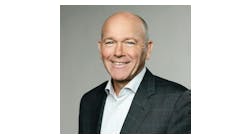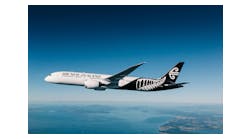Jan. 20--Norwegian Air Chief Executive Bjorn Kjos aims to do for international flying what Southwest Airlines did for domestic flying.
His upstart European airline is trying to pioneer a new low-cost carrier model that Kjos says could ultimately double passenger traffic across the Atlantic.
"Look what Southwest and JetBlue did in America. It should be very cheap to fly. It will be cheap to fly long haul," Kjos said in an interview. "If you manage to fly for low prices, you will bring millions of jobs because of all the tourists who will fly into the U.S."
Boeing has a lot riding on Norwegian's success. Just as Southwest leveraged the 737 to start the low-cost carrier business in the U.S., Norwegian has ordered 10 new 787 Dreamliners to get its low-cost, long-haul business started.
Naturally, the established U.S. trans-Atlantic carriers -- American Airlines, Delta and United -- have ganged up to stop Norwegian.
They and the U.S. airline-pilots union accuse Norwegian of seeking to set up a low-wage operation with foreign crews that will create unfair competition.
Kjos was in Washington, D.C., earlier this month to seek regulatory approval from the Department of Transportation.
He needs that because this Norwegian airline won't be based in Norway.
There is a so-called Open Skies agreement between the U.S. and the European Union -- one that was extended to include Norway (not an EU country) -- that already allows Norwegian to fly from anywhere in Europe to anywhere in the U.S.
But equivalent agreements between the EU and Asian countries don't include Norway.
So Kjos has set up Norwegian's long-haul subsidiary in Ireland, an EU member country with no restrictions on flights to Asia. Kjos needs the U.S. government to grant him a foreign air-carrier permit as an Irish airline.
Only then can he fulfill his plan to shuttle his Dreamliners from all over Europe to leisure destinations both in the U.S. and Asia.
With that Irish airline certificate, it can fly from Bangkok, Thailand, to London, then on to New York, without ever touching down in Oslo.
U.S. airlines cry foul
The airline has just set up its first foreign crew base in Bangkok. It will soon open one in New York, and by the end of March another in Fort Lauderdale, Fla.
By the end of the year, the airline plans to hire some 300 American crew members.
This summer, it hopes to operate out of Gatwick airport in London and to offer low-cost flights from London and other European destinations to New York, Fort Lauderdale, Orlando, Oakland and Los Angeles, as well as to Bangkok.
In filings to the Department of Transportation, the Airline Pilots Association (ALPA) and the big American carriers that operate trans-Atlantic flights are crying foul.
ALPA contends Norwegian has set up in Ireland "expressly to evade the social laws of Norway in order to lower wages and working conditions of its aircrew."
The salaries and benefits of pilots in the Irish long-haul subsidiary are "substantially inferior" to those of its Norwegian-based pilots, ALPA claimed.
A joint filing from American, Delta and United likewise argues Norwegian's application to operate as an Irish carrier is merely "a flag of convenience. to avoid Norway's labor laws and lower labor costs ... thus giving (Norwegian) a competitive advantage on transatlantic routes in direct competition with U.S. carriers."
Kjos, a down-to-earth, open chief executive who also writes spy thrillers and is a former U.S.-trained Norwegian fighter pilot, dismisses this critique as a self-interested smoke screen from competitors trying to protect their most lucrative international routes.
"The only thing they are trying to do is to stop the low-cost era from happening on the Atlantic," he said. "They are afraid prices will drop."
Norwegian must pay its cabin crews the going rate where they live, whether in New York, Florida or Thailand, Kjos said. It makes sense to set up bases at these big leisure destinations, rather than in Oslo, to streamline the operation, he said.
As for the pilots, he said they must have pilots' licenses approved by the European aviation authorities. He said he has hired plenty of retired KLM pilots, many with more than 20 years of experience.
"You have to pay the going rate," Kjos said. "Do you really think they will start to fly for Norwegian for just bananas, coming from airlines like KLM?"
One influential U.S. player who publicly supports Norwegian's application is John Byerly, a former assistant secretary of transportation in the State Department and a revered figure in the aviation world.
Byerly led the U.S. side in the protracted and tortuous negotiations that produced the 2007 Open Skies agreement with the EU.
Now he's a hired consultant for the law firm Norwegian engaged to make its case for regulatory approval.
In an interview, Byerly said he's involved because of his belief in the principle of the Open Skies agreement, which was supposed to open up and deregulate airline routes.
"It would be inconsistent with what we were trying to achieve in the U.S./EU agreement if Norwegian, the first serious low-cost carrier to enter the market with a new business model, were to be denied that opportunity," Byerly said.
"The U.S. signed an agreement with the EU. ... They have a right to fly" he said, adding "it's also the right thing to do for consumers."
"Why lock someone out?" Byerly said. "Maybe they won't succeed. Let consumers decide."
The Department of Transportation is waiting for the Irish authorities to formally issue Norwegian an Air Operator Certificate before making its ruling.
787 "the best airplane"
In a piece of inconvenient timing for Norwegian, it garnered lots of bad publicity at year end when three different Dreamliner flights to Oslo suffered long delays, stranding passengers in New York, Fort Lauderdale and Bangkok for days.
This followed a series of 787 service glitches that caused serious delays in September and prompted Boeing Commercial Airplanes chief Ray Conner to fly to Oslo and offer Kjos his personal assurance of support.
The delays have some critics suggesting Norwegian is too low-budget, operating on a shoestring.
Back home in Norway, where the long-haul-subsidiary registering in Ireland is unpopular, many passengers have lodged complaints with regulators about the service delays.
But Kjos says the problems with the 787 year-end flights and those earlier in the fall are unrelated. He blamed software issues for the delays in September and said those are largely solved.
Of the three incidents at year-end, he said two were problems not specific to the 787.
One of those left passengers stranded in New York for three days because in attempting to fix "a minor technical problem," maintenance technicians used the wrong procedure and made it into "a huge problem."
He later told Bloomberg News that the technicians at fault were Boeing engineers.
And in the third case, when a 787 air-conditioning unit broke, there was an extended delay because the relief crew sent to Bangkok had a mandatory rest before flying the next day to Oslo.
Overall, Kjos appears satisfied that the Dreamliner's performance is much improved.
"The airplane started out not too good, to put it mildly," he said. "There were a lot of problems in the initial phase."
But now, he said, "the aircraft is flying actually better and better. It will be an extremely good airplane."
Indeed, his whole long-haul, low-cost business model depends upon the 787. It's the Dreamliner's 20 percent fuel savings that will allow him to slash his costs and his ticket prices.
"You cannot fly low cost unless you have modern aircraft," Kjos said. "You have to fly with the Dreamliner."
"All the passengers that fly the Dreamliner, they love it," he added. "It's the best airplane you can fly."
___
Dominic Gates: 206-464-2963 or [email protected]
Copyright 2014 - The Seattle Times




